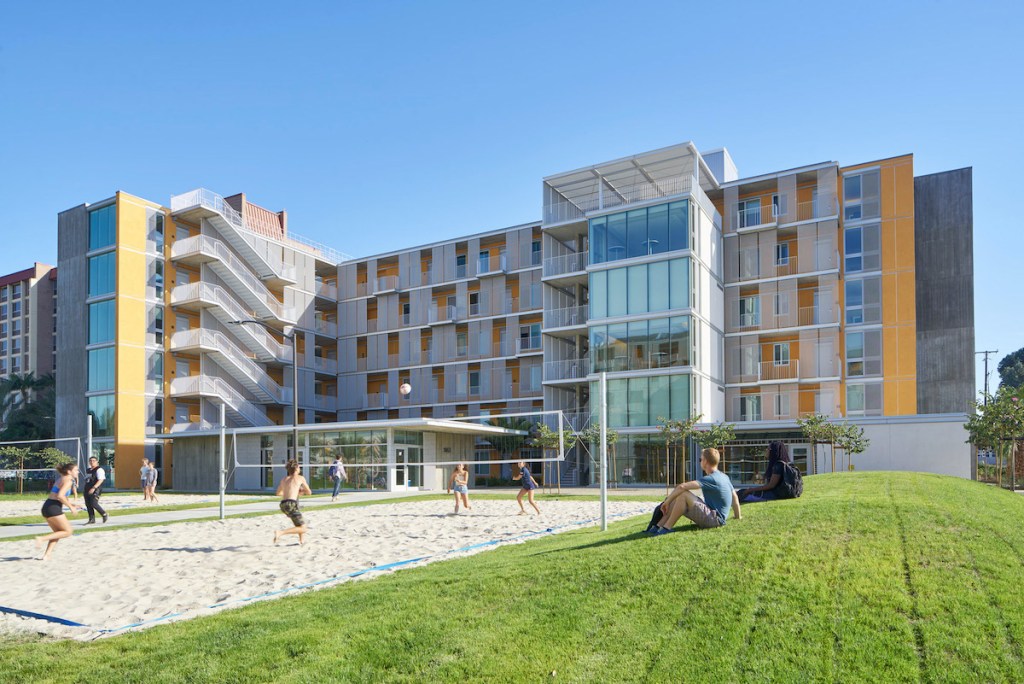The public outcry against UC Santa Barbara’s Munger Hall has grown so loud that the City of Goleta has taken the position that “there may be no certainty as to whether the needed student housing will be built in a reasonable time frame.” Those were the words of Goleta Mayor Paula Perotte in a city press release on Friday that announced Goleta will sue the UC Regents for failing to provide student housing and that it now impacts Goleta revenue and the city’s own ability to house its workforce.
Between the intractability of a billionaire donor — Charlie Munger, who offered the university $200 million and final plans he had made for a 4,500-person, windowless dormitory — and the COVID pandemic, the university finds itself in a tough spot. To reduce the number of students per room in on-campus housing because of coronavirus, it placed students in nearby hotel rooms. But those students came from the state’s push to increase resident enrollment and was not the university’s choice, UCSB indicated in statements provided by Andrea Estrada, director of communications. For Goleta, because the students stay for more than 30 days, no transient occupancy tax (TOT) can be collected, hurting a bottom line already compromised by COVID revenue losses.
Goleta’s lawsuit comes out of a 2010 settlement between the city and UC Regents that agreed to UCSB’s Long Range Development Plan as long as the school capped enrollment at 25,000 but kept pace by building housing for the 5,000 new students. According to UCSB’s “Facts and Figures” page, a total of 26,179 students were enrolled for fall 2020. And although the university has convulsed with construction in recent years, finishing the 1,000-bed San Joaquin Villages in 2017 and Sierra Madre Apartments in 2015, which holds 515 students, it is clearly short of enrollment. Since the two were completed, the highly controversial Munger Hall is the major project in the works.
Sign up for Indy Today to receive fresh news from Independent.com, in your inbox, every morning.
In a story the Independent broke in October, a consulting architect for UCSB’s design committee, Dennis McFadden, resigned in protest of “Dormzilla” — Munger Hall is as high as Godzilla is tall — writing that the university is ignoring the documented necessity for natural light, air, and views for mental wellness. The public, from the architecture writer for the New Yorker to editorials in the Los Angeles Times to student-led petitions, has piled on.
In reply, UCSB Chancellor Henry Yang has insisted Munger Hall will be built and called the design “inspired and revolutionary.” The university expressed itself in a press statement as “deeply disappointed that the City of Goleta felt it necessary to resort to divisive litigation that forces both parties to spend public funds in this manner.” UCSB further stated that it would pay the hotel bed tax to Goleta and that fall enrollment numbers were always higher than the average over three quarters, which has always been less than 25,000. The school noted the university’s annual benefit to the local economy — $2.3 billion when indirect business benefits were counted — and that it had kept all its employees, their paychecks, and their rent and mortgage payments intact throughout the pandemic.
From Goleta’s perspective, UCSB’s lack of housing forced a “reduction in the city’s housing supply and increases in housing costs for its workforce, and greater demands on city services,” Deputy City Attorney Winnie Cai told the Independent. Essential workers like nurses, teachers, and public safety officers had to commute instead of living in the city. Goleta had tried to resolve the issue informally with UCSB for several years, said Cai, but city spokesperson Kelly Hoover pointed out that UCSB had not reported its enrollment to Goleta since 2019, or its projected enrollment for the next five years, both a requirement of the Settlement Agreement. Of Munger Hall, “In the absolute best-case scenario, it would be several years before any students would be living in those dorm rooms,” Cai said. Ultimately, given the “harsh scrutiny” the university was facing, the city’s statement reads, “There is no foreseeable end in sight for these negative impacts on Goleta.”
Find all of our Munger Dorm stories at independent.com/munger-dorm.
Correction: This story was updated to correctly identify statements made by UCSB and the terms of the Settlement Agreement.
Support the Santa Barbara Independent through a long-term or a single contribution.

